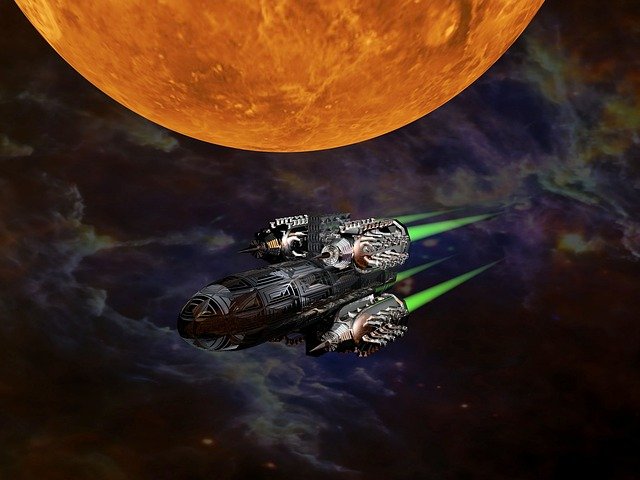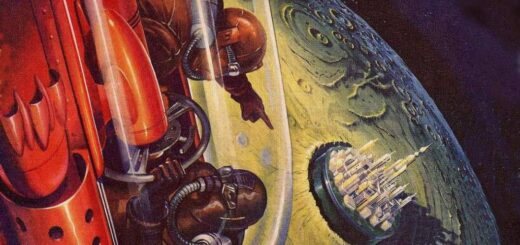Star Crash by Ryan Priest

Star Crash by Ryan Priest
We don’t know much about the universe. Never really have. This fact impressed itself upon the astronaut, as his small metal craft flew directly towards the bright, churning star that grew ever larger, ever hotter by the second.
We only have one sense outside of Earth. Sight. Our ears can’t hear the cosmos. We can’t touch it or smell it. We can only look.
They’d fired him away at near light speed, unraveling the universe atom by atom, to warp and twist space itself around the titanium arrow with its human payload. Without a sound and armed only with guesses, they’d ejected him off of the Earth and into an unknown so vast, that the brains of every human who ever lived, working in unison, could never begin to fathom it.
At best, the universe reveals itself to us through magnified points of light amidst a mostly black canvas. It’s really a problem of blindness and we throw our best minds, our best money and our best math at it but the truth is inescapable…We don’t really know what we’re looking at.
Hidden fields of scattered debris wider than our solar system, black holes or dark matter whose gravity could be bending all those rays of starlight. There might just be a cloud of refractive gas out there that’s throwing our entire view of wide swathes of the heavens out of whack. A nano meter here, a micron there and someone might carelessly mis-calibrate an astronaut’s trajectory, sending him headlong into a burning orange star.
A few hundred thousand miles off, a drop in the bucket for an overall distance spanning light years. However, a man might drive home from work twenty miles every day but if even one time he stops twenty feet too late, he’d find his car smashed through the back of his garage. Now, the astronaut found himself about to smash into a star.
The ship’s drive had decelerated him enough to putter into some exo-planet’s orbit, with small thrusters. But this thing in front of him, this oversized, million-year-old, atomic bomb was so damned big and he’d been dropped off so close, that his thrusters and navigational controls were useless against the strong arms of its gravity, as they pulled him in. Falling falling falling towards a molten ground.
Back home, they probably wouldn’t truly figure out what had happened. That they’d rocketed him across the universe headlong into a star. Sure, they’d know something had gone wrong when the warp field failed to re-engage and send him back.
They’d theorize and write equations. They’d employ every trick in the bag but at the end of the day, we just don’t know that much about the universe.
He tried to prepare himself for what would inevitably come next. There was no way to tell how many thousands of miles away he was, from its true, plasma body. The star was all he could see out of the tinted slit of a window or pick up with any of the external cameras. Very soon everything would become very hot, then very painful but then it’d all be over, just as quick.
He took a gulp of air to steady himself. The sweat rained down his face. Maybe the heat was already breaking through or maybe it was just nerves. Then, there was no question, as the miniscule cockpit became a sauna.
“Here it comes.” He whispered alone, a million miles away from the next set of ears. Breathing was becoming difficult, every breath felt like steam. The ship fell deeper and deeper towards the star.
But the cabin grew no hotter. Further he fell, yet the cabin seemed to have hit a plateau. It made absolutely no sense. At first, he thought that his mind was stretching out these last few seconds, making them seem like minutes but after a while he realized it was no trick of the mind. He was surviving. Hotter than hell but alive.
There was nothing to see out of the window but bright white, even through all the layers of tint. But he noticed in the heat vision display, an external FLIR camera, that there were small variations. Little blobs of discolored mass standing out from the background. But as he got closer and closer, he started to note movement within the blobs, then even closer and he could see that these blobs were made up of even smaller variations in temperature. Closer and closer and then, abruptly, he stopped.
A smooth yet immediate stop. So smooth he might never have realized that he’d actually ceased his descent, except for the heat camera and all the other instruments, which were still unaccountably working.
The grayscale display of the FLIR camera looked like television static, background noise. But as he stared at it, he began to notice patterns. Then he realized that he was looking at beings. Actual living beings. It was like right after an airplane take off. He could see the geometries of a city. The small movements in and around larger unmoving structures. He’d found a city on a star.
He had no idea why he’d stopped where he had, suspended above these strange and wonderful bits of heat variance. Neither did he realize why he and his ship hadn’t liquified and vaporized yet. The sensors noted that the surrounding temperature was about four thousand degrees Celsius. Titanium’s melting point is around thirty-two hundred, yet the internal thermometer said it was only forty-five Celsius inside the cabin. Uncomfortable, unbearable even but far from vaporization.
On the screen, he noted five little bits of heat variance that were growing larger. They were approaching.
He tried to see them out of the window but it was too bright. All he saw was light. But through the FLIR, he could see that they were rising to surround the intruding ship that hovered above this solar city.
From what he could tell, individually they were about the size of his ship, maybe twelve feet tall. He could see only their silhouetted forms, with the same fuzzy lack of definition that looking at a person through thermographic imagery would produce. Just a mass of tiny ever-dancing flames. He knew he wasn’t looking at them, only their heat.
He waved, not knowing if they could see him or even had any concept of him. Then the ship began to spin around, first this position, next that way. They were examining him. He couldn’t tell if they were aware that he too was sentient creature, inside this metal can. Or even that he was, in fact, separate from the can.
A moment later and he received the only sort of answer he would ever get. Without warning, just as quickly as he’d stopped, he began to jet away. Away from the star people, their star city and then finally out far enough away that the breathtaking realization dawned on him that he could see a dark curve around the burning orb. He was moving away from the star itself!
Then silently, the entire star shrank until it was a small orange ball dotting the far horizon on a black night, and just as soon, it was only one of a million bits of light. Then an ultra-bright flash of light all around him and his small little craft. His sturdy, universe trotting craft. A craft he was pretty sure had just seen more and flown faster than any other spacecraft known to man. There, outside of his window, he could see that he was now suspended in the air, about twenty or thirty feet above the base in Florida. So close that he could make out the shocked and dumbfounded faces of all the physicists and engineers staring out of their office windows.
Somehow, those star creatures knew. Maybe it was a trajectory analysis. Maybe they’d been watching us the entire time, but somehow, they knew where he’d come from and they sent him back. Catch and release. It’s doubtful we’d have been as nice had the situation been reversed.
He knew there’d be a whole lot of question about to come his way and they’d probably continue for the rest of his life but the cold truth of the matter is, we simply don’t know an awful lot about the universe or what is in it.
THE END
Copyright Ryan Priest 2020



